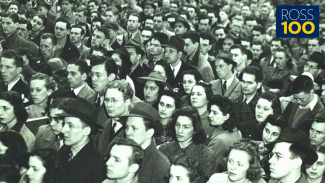A Business School Responds to the World

Although a university can sometimes feel isolated from the events of the outer world, inevitably those events affect life on campus. During the past hundred years that the University of Michigan has housed a business school, the United States has experienced several wars; transformational changes in society; various economic crises; and so much more. Here are just a few examples of outside events have shaped the school:
The Great Depression
Just five years after the founding of the School of Business Administration, the Great Depression hit. The school fared remarkably well.
The book Tradition, Vision, and Change: Business Education at the University of Michigan 1900-2000 relates that despite the Depression, admissions standards at the school stayed high, enrollment remained fairly steady, and graduates largely found work—often with the assistance and intervention of faculty members who helped match graduates with positions that fit their abilities.
In fact, the book notes that the country’s economic woes actually gave the school an advantage: “The Depression increased public demand for better business education. To assist in this time of national distress, many members of the faculty turned their research focus to such topics as the banking crisis.” Several faculty members were involved in recommending reforms to the banking system. Meanwhile, the Bureau of Industrial Relations, founded in 1935, focused on management education and employer-worker relations.
World War II
The attack on Pearl Harbor transformed the entire university. Tradition, Vision, and Change relates how the business school contracted with the federal government to teach supply corps candidates; by 1944, almost half the school’s students were members of the Navy, Army, or Marine Corps.
The school also instituted a new program that prepared women for jobs in government or other openings left vacant by men joining the armed forces.
Some faculty members served the war effort directly, including Robert Briggs, an accounting professor who took leave from the business school to serve as head of general administration at the Detroit Ordnance District. Others served in Washington, while the faculty who remained in Ann Arbor took on extra course loads to fill the gaps.
Following the war, enrollment skyrocketed thanks to veterans on the GI Bill, ultimately leading to the construction of new facilities to meet the increasing demand.
Changing Society
The 1960s saw the beginnings of tremendous changes in society, as women increasingly took on new roles, mistreatment of minority groups gained more attention, and young people like never before questioned why they were being sent away to war. While antiwar protests on the Michigan campus largely stayed away from the business school—and enrollment of women slowly increased—the school became a particular target for activists frustrated by the lack of minority students.
In 1966, a committee was formed to attract more minority students, but its efforts were not successful. By the early ‘70s, protesters used marches and chalk graffiti to bring new attention to the issue. Tradition, Vision, and Change relates how one demonstration included smoke bombs and loud cheering in the front lobby.
Progress remained slow, and efforts continue to this day. One lasting development from this era was the establishment of the Black Business Students Association. One of the first organizations in the country for African-American business students, the BBSA continues to advocate for students and to sponsor a high-profile annual conference.
Environmental Issues
Concerns about the impact of business operations on the natural world started to gain widespread traction in the 1970s, and in 1996 the University of Michigan started a new initiative to address them directly. The Frederick A. and Barbara M. Erb Environmental Management Institute was founded as a pioneering collaboration between the Business School and the School of Natural Resources and Environment (now the School for Environment and Sustainability).
Established through a $5 million endowment gift from Frederick Erb, BBA ’47, and his wife, Barbara, the institute was a groundbreaking idea—that business must improve its environmental performance. In the years since, that concept has become much more mainstream, and the Erb Institute broadened its mission “to create a sustainable world through the power of business,” including social issues such as employee engagement, human rights, and diversity and justice.
At the same time, environmental issues have become more common in the core business school curriculum, from operations to Multidisciplinary Action Projects.
COVID-19
The most recent outside event to transform the business school took hold in March of 2020, as the COVID-19 pandemic forced Michigan Ross and the rest of the university to shift to remote operations. Classes—and other key events, including Commencement—would remain fully remote until fall 2021. The school offered support for students and staff, and “Zoom” quickly became part of the community’s vocabulary.
The school’s response to the crisis went far beyond logistics, however. The entire Michigan Ross community pitched in however it could to make the pandemic manageable: student groups organized fundraising initiatives to help small businesses and charities harmed by the pandemic, while students also offered advice and assistance to businesses coping with the challenge. Numerous alumni were on the front lines of the fight, pursuing healthcare innovations to help fight the virus.
Faculty members turned their research focus to numerous pandemic-related subjects. These included COVID’s varied impact on different ethnic groups, which public health interventions were most effective, and the effect of pandemic-related anti-Chinese bias on Asian-American businesses. In addition, Michigan Ross Executive Education launched two online seminar series aimed at helping participants navigate the immediate and future opportunities and challenges of the “new normal” created by the pandemic.







